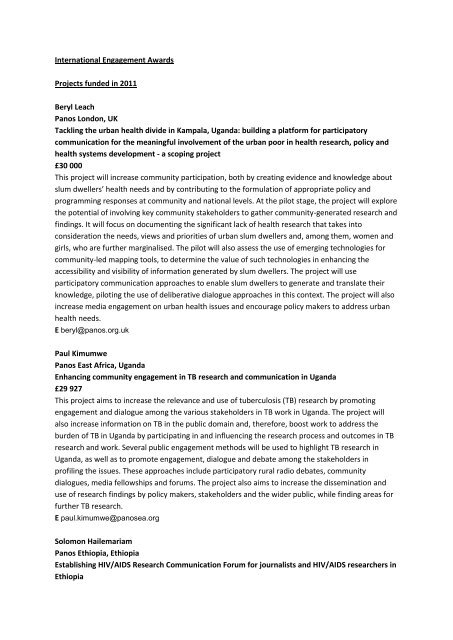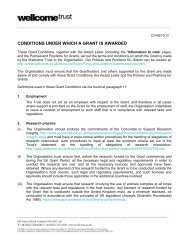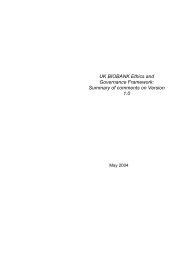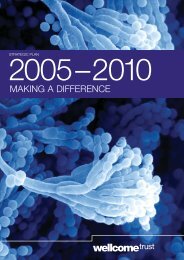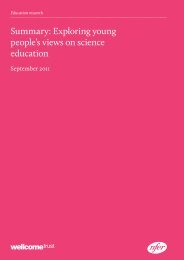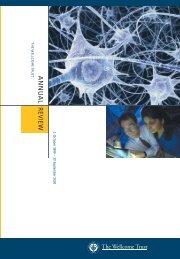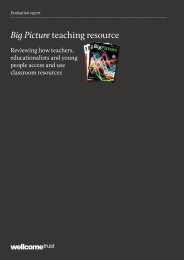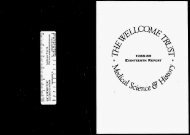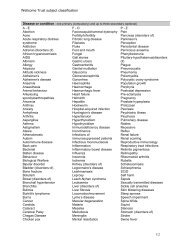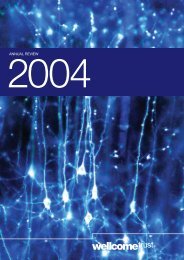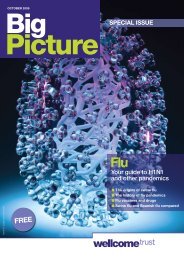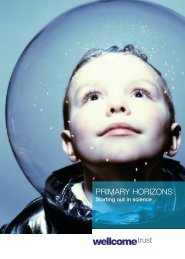International Engagement Awards Projects funded ... - Wellcome Trust
International Engagement Awards Projects funded ... - Wellcome Trust
International Engagement Awards Projects funded ... - Wellcome Trust
You also want an ePaper? Increase the reach of your titles
YUMPU automatically turns print PDFs into web optimized ePapers that Google loves.
'Unlocking the mysteries of medical research in Malawi through a participative exhibition at MLW'£30 000Researchers at the Malawi-Liverpool-<strong>Wellcome</strong> <strong>Trust</strong> Clinical Research Programme have engaged ingenuine dialogue with local communities about the perceptions of medical research both throughCommunity Advisory Groups in rural communities and science cafés in urban Blantyre.In this pilotstudy MLW plan to complement this existing work with an exhibition aimed at study communitiesand school children studying science.The project will create a participative exhibition that exploresresearch through the eyes of the researcher, medic, patient and participant.The exhibition willcommunicate knowledge from MLW research specifically as well as fostering a more generalawareness of medical science.Ultimately this project hopes to generate debate on the value ofmedical research to Malawian society. The project will be based at MLW in Blantyre and will be ledby MLW's Science Communication Officer.E tchipasula@mlw.medcol.mwJohn ImrieAfrica Centre for Health and Population Studies, South Africa'Jiving to a science beat: Using radio-style interviews and popular music to disseminate AfricaCentre's health research, foster community dialogue and promote evidence-based health practicesin an area of high HIV-prevalence in rural South Africa'£30 000This projectintends to use popular music to engage community members in KwaZulu-Natal, SouthAfrica where the Africa Centre is situated and conducts population studies into HIV/AIDs within theregion. Three CDs will be developed, distributed and their impact evaluated over a two yearperiod.Each CD will contain a radio-style information interview, interspersed with popular localmusic and targeted health promotion messages.The CDs will be distributed so that they can beplayed in communal spaces such as local mini bus taxis which have 50-60 000 weekly users and hairsalons.The project aims to increase community awareness of the work of the Africa Centre and thehealth research it conducts; develop and deliver evidence-based health promotion messages basedon the Africa Centre's HIV research; and engage with new and hard-to-reach sectors of thecommunity in a dialogue about the research of the Africa Centre, producing sustainablepartnerships.E mmahlinza@africacentre.ac.zaNicola JefferyTarget Tuberculosis (Target TB), UK'Building research skills and capacity among Non Governmental Organisations (NGOs) working atthe grassroots level in Tamil Nadu, India'£29 965The overall aim of this project is to improve the research skills of Non-Governmental Organisations(NGOs) in Theni district, India to enable them to evolve as key players in health research and policy.Health researchers from Maharashtra Association of Anthropological Sciences (MAAS) will work withDevelopment Action Consortium <strong>Trust</strong> (DACT) and a network of NGOs in Tamil Nadu, implementinghealth and development programmes to build their skills in health research. MAAS will carry out anassessment of research training needs for NGOs in Theni district and develop a standard trainingmodule. This will be trialled on a group of NGO workers who are interested and have the capacity todevelop health research skills. A group of six people from DACT will be selected as master trainers inhealth research and will receive training from research experts to become trainers of trainers. These'master' trainers will be supported to cascade skills and knowledge on health research to 80 otherNGO staff from the area through a series of training workshops. Ultimately a network of trainedresearchers in the field will be established to formulate a ready resource base for the engagement ofNGOs in health research. To find out more, see the Target Tuberculosis website.
E njeffery@targettb.org.ukE info@targettb.org.ukLuisa MassaraniOswaldo Cruz Foundation, Brazil'"Sarau Cientifico", a project for engaging low income communities in biomedicine research andbioethics'£29 818This project will design and deliver a "Sarau científico" (Science Party). The "Sarau científico" buildson the Science Café concept by aiming to discuss science in an informal space but with an addedingredient of Brazilian cultural to create a mood in which low income young people feel comfortableand motivated to actively participate."Sarau científico" is an informal party in which people meet todance, sing, read poems and other cultural expressions, as well as chat and share opinions and ideas.The activities will be designed, in a participatory way, by a multidisciplinary group includingscientists, experts in bioethics, science communicators, musicians, actors and young people who livein the low income communities around the Museum of Life. After the period of 12 months of thisproject, the "Sarau científico" will become a permanent activity in the Museum of Life where theproject is to take place. Among the themes to be discussed are clinical trials using humans, stem-cellresearch, cloning, genetically modified crops, HIV/AIDS, experiments in animals, human genetics,genetic mapping and genetic determinism.E nestudos@fiocruz.brChristine MunduruLocal Language Science Café, Uganda'Expanding and strengthening Science Cafés in local languages in rural communities in Uganda'£10 500This project aims to deliver local language Science Cafés in a variety of communities and villages inUganda. The main purpose of these science cafés is to communicate science and technology to thosewho do not normally have access to such information which is invariably locked up in libraries,journals, and information management systems.In the belief that when science and technologyissues are explained in one's first language itis more readily understood and such knowledge can beadopted to help solve some of the immediate problems that people face. Local language cafés hopeto present an avenue for unlocking this information and making it available and accessible to therural poor.In turn this will empower communities with knowledge that will enable them to makeinformed choices by making scientific information easily accessible to them, in a more relaxed,convenient and non-academic environment.E cmunduru@yahoo.comBonnie Jeanne SaxonReproductive Health and HIV Research Unit (RHRU), South Africa'Engaging the public in clinical trial research using radio drama, popular journalism and listenerclubs - a pilot for 'Tsheriletso Health Talk''£29 853This project aims to create greater awareness and dialogue about clinical trials through a dynamicthirty minute public health radio show called 'Tsheriletso Health Talk.'The radio show will includeradio drama, man on the street interviews and a community based listener club. ReproductiveHealth and HIV Research Unit (RHRU) has extensive experience using community radio as acommunication tool to disseminate information and raise awareness about clinical trials. Theprimary target audience of the show will be the trial community, clinical research staff and theCommunity Advisory Group advising the research process. Script writing professionals, clinical
esearchers and trial participants will be invited to a workshop where real stories about being aclinical trial participant will be fictionalised. The moulded scripts will be aired on the show andlisteners will be invited to SMS (text) and call with questions or comments. There will then be theopportunity for the general public to respond and give their opinions about clinical research inrecorded interviews.To complement this, a community based listener club will be established tosupport debate about the content of the show.E info@rhru.co.zaElspeth BartletScidev.Net, UK'Capacity-building programme for African press officers working in health and science'£29,800This project aims to improve the quantity and quality of media coverage relating to African science,particularly in the medical field, by providing targeted training, networking and resources for pressofficers from African research institutes. The project will involve a capacity-building workshop and anetworking event to be organised to coincide with the 7th World Conference of Science Journalistsplanned for Cairo, Egypt in June 2011. The outcomes of the meeting will be used to create a guidefor African science/health press officers, which will be broadly disseminated. In addition, Africanpress officers will be encouraged to provide mutual support for each other and an online discussiongroup will be established for this purpose. SciDev.Net websiteE eb526@york.ac.ukMary ChambersUniversity of Oxford/<strong>Wellcome</strong> <strong>Trust</strong> Major Overseas Programme Vietnamp(L)ace of change£29 400p(L)ace of change is a media led investigation into the rapid development occurring in Vietnam, theimpact this change has on health and wellbeing and what communities have to say about it. The firstphase will involve a series of community authored films. These Digital Stories will focus on health,development and the environment, engaging individuals with the issues around them. The focusareas will be developed as part of an ongoing discourse with science professionals from the MajorOverseas Programme in Vietnam. Alongside the community authored content, professionalfilmmakers and health researchers will develop media that enhances the local narratives, addingscientific quality and depth to the content. The resulting DVD will then be used in facilitatedcommunity discussions. The project will culminate in a novel media site that will facilitatecommunity discourse as well as global awareness of development issues, captivating and educatingaudiences through touching personal stories, rigorous science and a uniquely interactive experience.Oxford University Clinical Research Unit Vietnam websiteE mchambers@oucru.orgE nick@factandfiction.tvNadia El-AwadyWorld Federation of Science Journalists, Canada'Biomedical Sciences Strand, 7th World Conference of Science Journalists'£30 000This project entails the production of a biomedical strand for the World Conference of ScienceJournalists, to be held in Cairo, Egypt in June 2011. A key element of the program will be explorationof ways that science writers engage with their communities, help build science literacy, andunderstand public health and biomedical issues and encourage readers, viewers and listeners toparticipate in scientific decision-making in their daily lives. The following themes will be woven intothe program: viruses and vaccines; reporting pandemics; can better science - and its communication
- help Africa fix itself?; the malaria challenge; new tools for medical journalists; buildingcommunities; navigating pharmaceuticals; risk reporting and superstition and disease. The aim ofthe strand is to enable journalists to hear from scientists and journalists at the cutting edge of theseissues from all regions of the world. In this way it intends to take them beyond basic researchreporting and facilitate discussion of the social, cultural, and ethical impact of these areas ofresearch and the responsibilities journalists have to report science within a broader social context.E Nadia.elawady@wcsj2011.orgRachel JonesKEMRI-<strong>Wellcome</strong> <strong>Trust</strong> Research Programme, Kenya'The Kenyan Alliance of Health and Science Journalists (KAHSR)'£27 337This project aims to establish a formal journalism support and training organisation, the KenyanAlliance of Health and Science Journalists (KAHSR). This organisation aspires to identify and nurtureKenyan journalists who have shown an interest or expertise in covering health and science-relatedissues. This will involve regular email briefings and informational updates and mentoring support.There will also be formal briefings, which would highlight health and science-related topics in thenews, the latest research, and policy analysis. Over the course of a year, five general briefings indifferent regions of Kenya will be interspersed with email alerts with story leads and suggestionsabout newsworthy trends and policy developments to pursue. The KAHSR will aim to run quarterlytraining workshops, which would be held at the KEMRI-<strong>Wellcome</strong> <strong>Trust</strong> Research Program in Kilifi.Journalists with a proven track record of producing health and research related stories would beable to compete for one of six slots at each of four workshops. These workshops would involve aweek's immersion in the Kilifi program, including interactions with researchers, field trips, andguided writing and reporting exercises. The aim of the training workshops would be to produce acadre of reporters with a level of exposure to scientific and research practice that could dramaticallystrengthen their basic knowledge, comprehension and initiative in reporting on health and scienceissues.E rjconsults@gmail.comE kahsr.media@gmail.comE rachella45@yahoo.comWasundhara JoshiSociety for Nutrition, Education and Health Action (SNEHA), India'Art and health in urban India'£29 838This project intends to conduct a series of activities that foster dialogue between formerlysegregated communities: slum dwellers, professional artists and health scientists. The activitiesinvolve collaborations between established artists and emerging artists from Mumbai's majoritycommunities. Artworks will be developed for an exhibition of pictorial and plastic arts, film and liveperformance on an urban health theme. The project will culminate in an exhibition of creative workson the health of people who live in India's slums, to be displayed at the <strong>International</strong> Conference onUrban Health which will be hosted in India in 2011. SNEHA websiteAnh NgoCenter for Promotion of Advancement of Society, Vietnam'Using participatory action research to engage children with disabilities and their families indeveloping health initiatives to improve their access to health and social services'£30 000This project seeks to engage the community in the development of health initiatives to improveaccess to health and social services for children with congenital anomalies or disabilities and their
families in Aluoi district, Thua Thien Hue province, Vietnam, an area heavily affected by the use ofAgent Orange during the Vietnam American War.Specific objectives are to: 1) raise awareness aboutcommunity's perceptions of and experiences with congenital anomalies and disabilities; 2) engagechildren with disabilities, their families and their communities in research that addresses theirunmet needs for health and social services; 3) promote dialogue between health researchers,children with disabilities, their families and their communities on health initiatives aimed atimproving access to and the quality of health and social services. The project will employ aparticipatory action research (PAR) approach that involves the target populations in the wholeresearch process, including selection of research topics, data collection and analysis, and generationof policy and practice recommendations or action.Vikram PatelCentre for Global Mental Health, the London School of Hygiene & Tropical Medicine, UK andSangath, India'EMPOWER: Empowering people affected by Mental disorders to Promote Wider <strong>Engagement</strong>with Research'£30 000One of the major barriers in facilitating the scaling up of mental health services in developingcountries is the marginalised voices of people affected by mental disorders and the limited capacityof groups representing them ("user organisations") to articulate positions based on science. The aimof this proposal is to strengthen the capacity of user organisations in sub-Saharan Africa and SouthAsia to utilise research findings to develop a plan for engagement with the wider community, toimprove the understanding of the nature and treatment of mental disorders and reduce thepervasive stigma associated with these conditions. This project will achieve its objectives through aseries of linked activities: participation of each user organization in the annual Leadership in MentalHealth course in Goa, India in November 2010 where the participants will interact with researchersand practitioners to develop the key messages for the communication strategy; developing thecommunication strategy around these key messages, contextualised for each setting; increasing theacceptability of the Movement for Global Mental Health (MGMH) website, and the partnerorganisation web-sites, for non-professional audiences, with technical support from web-designexperts; and dissemination of the communication strategies through the websites and presentationat the Global Mental Health Summit in Cape Town in October 2011. Ultimately, the strategies will bethe basis for concerted campaigns in each country to call for action to achieve the goals of theMGMH.E Vikram.patel@lshtm.ac.uk<strong>Projects</strong> <strong>funded</strong> in 2009Simon BrookerLondon School of Hygiene and Tropical Medicine, UK'Enhancing the understanding and use of health research in media and national policy frameworksin Kenya.'£29 645This project will develop a model of public engagement with media and policy frameworks in Kenya.Four inter-related engagement activities will take place, including: a press briefing workshop, wherejournalists will be exposed to health research and receive training in reporting and writing healthstories; a policy briefing workshop, where the role of health research in decision making and howresearch can be better utilised will be explored; science cafés where members of the public discusshealth topics in a casual and participatory forum; and media training for Kenyan health researchers.Each activity will target a different audience, but will be supportive of one another. The project willinitially focus on the use of maps of malaria and helminth infections to support disease control
efforts in Kenya, but will serve as an entry point for developing a strategy of public engagement forthe wider research portfolio of the Public Health Group in Nairobi ( Malaria Public Health andEpidemiology Group and the KEMRI-<strong>Wellcome</strong> <strong>Trust</strong> Collaborative Programme, Nairobi) with the aimof improving dialogue between researchers, media and policy partners in Kenya.E sbrooker@nairobi.kemri-wellcome.orgE jmutheu@nairobi.kemri-wellcome.orgValerie CorfieldUniversity of Stellenbosch, South Africa'Catalysing partnerships: the role of science centres as intermediaries between the public andscientists in engagement with biomedical sciences in South Africa.'£29 121This project will build new partnerships between science centres and scientists throughout SouthAfrica and strengthen capacity to build a sustainable network of biomedical science communicatorsversed in best practice principles of public engagement.Training resources developed will beintegrated with the surveyed requirements of target audiences - senior school learners, educatorsand the general public - and the needs of science centre facilitators and scientists. To achieve this,the applicants will formally capture experience and impressions gathered during more than tenyears of involvement in public engagement by the principal applicant and the MTN Sciencentre, inorder to evaluate what works best in a South African setting.This formalised evidence will provideguidelines for workshops for facilitators of the Southern African Association of Science andTechnology Education Centres and for scientists. National experts will expound the principles ofpublic engagement relevant to local audiences at these workshops, which will be held in threegeographically distant science centres, thereby allowing maximum country coverage and supportingpartnership development.E vc1@sun.ac.zaE julie.cleverdon@mtnsciencentre.org.zaDerek FishUnizul Science Centre, South Africa'Smart Science: An HIV/AIDS education initiative aiming to prevent new infections in school goingchildren by encouraging a correct understanding of current health research through a scientificapproach.'£30 000This project will involve the design and implementation of a unique health education initiative whichstresses a correct scientific understanding of the issues surrounding the HIV/AIDS pandemic as thebasis for sensible lifestyle choices. Making use of Unizul Science Centre's well establishedrelationships with rural schools, the project will introduce a health education component intoexisting programmes. The initiative will be aimed at Grade 8 pupils (in their first year of secondaryschool) as they are all taking science, and are vulnerable to infection in the ensuing years ofsecondary school. The project will ensure two in-depth interactions with each of 4000 pupils drawnfrom 25 secondary schools. In addition, the project will work extensively with their teachers toensure that they are in a position to continue the impact long after the visit.E thefish@iafrica.comFiona FlemingActing Against Worms, c/o Schistosomiasis Control Initiative (SCI), Imperial College London, UK'Acting Against Worms'£30 000Acting Against Worms (AAW) is a Ugandan project which aims to implement behavioural controlmeasures through engaging school children and teachers in developing their own drama productions
equiring children to actively take note of detrimental daily activities which precipitate disease.Unlike other health education programmes, AAW requires participants to explore the causes andpreventions of worms through deconstruction of the issues and their re-assembly into plays basedon this information. Plays need to deliver a positive and clear health message. The messages will bereinforced through peer-education with schools acting out their plays in front of an audience ofother schools and also to their local communities. Constructive criticism will be encouraged as partof the learning process. Further dissemination of both methods of public engagement and the healthmessages will be accessible to parents, other health and education leaders and the community whowill be invited to the drama festival. Through guidance from professional drama producers and localcommunity based organisations (CBOs) that practice drama, workshops, rehearsals and ultimatelyperformance, AAW aims to enhance local skills and provide a practical vehicle for public engagementin health on a community level. For more information see the SCI website.E f.fleming@imperial.ac.ukE Beckyoktar@hotmail.comPaul NampalaUganda National Academy of Sciences, Uganda'Integrating results of health research into policy making for improved health services in Uganda'£30 000This project will contribute to evidence-based decision making in the health sector and toimprovements in healthcare systems in Uganda, by promoting dialogue and creating new channelsfor engagement between policy makers (focusing on Members of Parliament), health researchersand other key stakeholders. The project is based on an innovative process known as "MP-pairing".For each year of the three year project, five or more Ugandan MPs will be "paired" with a Ugandanhealth researcher in a relevant area.The researcher will spend time shadowing the MP in Parliamentand visiting his/her constituency, and the MP will visit the researcher's workplace. This will exposeMPs and researchers to the constraints under which each operates and provide new channels forinformation to flow between researchers and MPs. The project will also promote skills developmentas the researcher will be given training in how to communicate research to policymakers. The pairswill each be allocated a specific topic to discuss and will produce a policy briefing for disseminationwithin and outside Parliament. This project draws upon and extends the "MP-scientist" schemepioneered in the UK by the Royal Society and piloted in Uganda in September 2008 by the UgandaNational Academy of Sciences with support from POST and the Royal Society. The project builds onprevious work by UNAS in the area of enhancing public engagement in health research, using the"pairs" to spearhead debates in a variety of contexts, ranging from school events to high leveldiscussions involving journalists, civil society groups, policy makers and academics.E unas@infocom.co.ugE paulnampala@unas.or.ugPieter RemesNational Institute Medical Research, Tanzania'Using participatory radio to disseminate and debate research findings on how parents influencetheir adolescents' health in Mwanza.'£30 000This project will create a series of 12 half-hour radio shows, focusing on the influence of parentadolescentinteractions on adolescent health and health-related behaviours, including HIV and STIrisk, in the Mwanza Region, Tanzania.The shows will feature discussion, phone-in, village interviewsand a 10 minute drama series. It will be broadcast through Radio Free Africa, a Mwanza-based radiostation with a national broadcast reach. The series will be produced through radio workshops andvillage-based fieldwork by a team of health researchers, media practitioners, parents/caregiversfrom rural communities and district representatives.For more information, visit the National
Institute of Medical Research website, the Social and Public Health Science Unit website and theMema kwa Vijana website.E p.remes@sphsu.mrc.ac.ukJonathan StadlerReproductive Health and HIV Research Unit, South Africa'Improving communication about uncertainty of clinical trial outcomes: using the collaborativeproduction of song to facilitate dialogue between communities and clinical staff about the risksand benefits of research in Johannesburg, South Africa.'£29 973This project focuses on a collaborative participatory process using a local South African musical artform called kwaito, to promote a local language about clinical trials, highlighting the uncertainties oftrial results. The project activities will involve young, local aspiring musical talent in collaborationwith participants from Soweto and Orange Farm in Johannesburg, in an HIV prevention clinical trial,with local community stakeholders and clinical trial staff, to write the lyrics for a kwaito song whichthe young musicians will then perform and record. The song will be broadcast on community radio,inviting feedback and discussion from community members, stimulating dialogue about the risks andbenefits of clinical trial research in the context of developing new technologies to protect men andwomen from HIV infection. It is envisaged that this process of collaboration between the public, trialparticipants and medical researchers will provide a learning experience for researchers to enhancethe communication of trial results and for the communities in which research takes place to fosterimproved understandings of the nature of clinical trials. The project will demonstrate the use ofcultural expressive forms - in this case a locally developed musical style - in proving a vehicle forpromoting dialogue between medical researchers and the public.The outcomes of the project will bedisseminated widely to other clinical trial networks, in academic journals and through email listservers, to promote the concept of social engagement around uncertainties of similar trials. Visit theReproductive Health and HIV Research Unit website.E info@rhru.co.zaMario Tristan<strong>International</strong> Health Central American Institute Foundation, Costa Rica'Engaging policy makers to promote evidence-informed health policies in Latin America.'£30 000This project will develop a web-based audiovisual bulletin to promote evidenced-informed publichealth policies in Latin America. The bulletin will target policy makers and technical officers from theLatin American National Health Authorities.Becoming familiar with what constitutes sound evidenceto inform decision-making, raising awareness about the advantages of evidence informed policiesand providing a practical overview of the operational process are critical steps toward systematisingthe use of research results in decision-making. The proposed bulletin will explore theaforementioned concepts as well as other critical aspects of "bridging the know-do-gap" in publichealth using a case study format. This is a joint proposal of the Ibero-American Cochrane Network(IBCN), the Pan American Health Organization (PAHO), and the Ibero-American Ministerial Networkfor Health Education and Research (RIMAIS), which will bring together their expertise to ensureproper dissemination channels for the bulletin.Joanne CarpenterPanos London, UK'Creating informed and inclusive stakeholder and public debate for access to Sexual andReproductive Health Information and Services in Kenya.'£30 000Kenya faces significant challenges in sexual and reproductive health (SRH). Although the country
made progress on reproductive health indicators during the 1970s and 1980s, more recently theyhave stagnated or reversed. 14 700 Kenyan women die each year from pregnancy relatedcomplications and unsafe abortion accounts for 30 to 50 per cent of maternal death. Use ofcontraceptives has stagnated at 39 per cent among married women, and gender-based violence iswidely perceived as normal behaviour. Medical and social science research offers important insightsand solutions, but many SRH issues remain invisible and taboo as public engagement is limited andSRH low on Kenya's policy agenda. This 12-month Panos/ Institute of Development Studies RealisingRights project aims to spark evidence-informed stakeholders and public debate on SRH issues inKenya by working with editors and journalists, health researchers, CSOs, policymakers andcommunities. Activities will include SRH mapping: identifying gaps in media coverage and barriers toresearch communication and stakeholder engagement; multi-stakeholder forums: promotingopportunities for collaboration to promote public and policy engagement on SRH; an expert boardsupporting research-informed media coverage and multi-stakeholder coalitions; communityconsultation and journalism: capturing the voices of women and men affected by SRH issuesincluding in media coverage; and, policy briefings advocating for improved research communicationand stakeholder engagement around SRH.E joanne.carpenter@panos.org.ukMary ChambersUniversity of Oxford/ <strong>Wellcome</strong> <strong>Trust</strong> Major Overseas Programme Vietnam'Đổi mới in science!'£30 000Đổi mới in science! aims to foster a long-term community interest in the social, cultural andhistorical context of scientific research in Viet Nam and how it relates to people as individuals and topeople who are part of the wider community.The project will initially concentrate on the media andthe local community by developing initiatives which will bring science to the forefront of people'sminds in an engaging and entertaining way. Planned activities include theatre productions, livelydebate and informed writing.Sharing knowledge with these groups will help to develop anunderstanding of the value and need for scientific research.The Science Cafés will target olderteenagers, young adults and University students.The scientific theatre group will target childrenbetween the ages of 10 and 14, and their parents. Visit the University of Oxford/ <strong>Wellcome</strong> <strong>Trust</strong>Major Overseas Programme Vietnam website for more information.Mayada ElsabbaghCentre for Brain and Cognitive Development, Birkbeck, University of London, UK'Promoting evidence-based practice for autism in the Arab World'£30 000This project's vision is to promote public engagement with autism research in the Arab world. Theproject will work across four Arab countries, initiating a two-way learning process aimed atintegrating scientific evidence within the context of characteristics and values of those affected byautism within each country. A series of workshops will be conducted with the families and educatorsof people with autism. The workshops will be designed with input from leading international figuresin autism research and individually customized to maximally benefit stakeholders in each developingcountry. By increasing awareness of the state of the science, the immediate impact will be toimprove family and educators' practices towards people with autism. The process will alsocontribute towards deriving future research needs and priorities directly from these stakeholders,with the hope that their vision will influence the local and global research agenda. For moreinformation visit the Centre for Brain and Cognitive Development website.E m.elsabbagh@bbk.ac.uk
Neil FrenchLondon School of Hygiene and Tropical Medicine, UK'Empowering rural communities to engage in health research discourse'£30 000Karonga Prevention Study (KPS) is known within its local community and associated with health careimprovement, in particular the disappearance of leprosy. In order to maintain public confidence andto increase responsiveness to local needs, a community engagement plan is proposed. Within this,activities will take place which: identify the level of awareness and motivation towards KPS researchamong staff, community groups, authorities, NGO's; increase the capacity of field staff tocommunicate health research; increase awareness and understanding of local attitudes to healthresearch in interactive dialogue; develop strategic partnerships with external stakeholders; and,explore new ways to communicate health research in remote and rural areas of Malawi. Theactivities will be closely evaluated with a view to incorporating the most effective activities into thenext strategic KPS programme.E kpschilumba@lshtm.ac.ukGabriel HarpSrishti School of Art, Design and Technology, India'"Watercasting": piloting the use of participatory media for identifying public health and watermanagement concerns in India.'£30 000"Watercasting" will encourage a two-way engagement between public health researchers and policymakers using cultural artefacts and participatory media to drive critical reflection about personal,community and policy decisions affecting water and public health management.Initial activities willsee a creative process engaging public health researchers and the community with artefacts whichwill elicit peoples' physical, emotional, and social relationships with water and its effects. Publiclyaccessiblemaps will then be made, illustrating the cultural and physical domain of water and itshealth consequences in everyday life. Films will be distributed to stakeholders including policymakers, economists and public health researchers. The films will explore the 'flow' of water throughindividuals, animals, infrastructure locations and policy decision points and will be informed by thedata collected in the initial activities. A final activity will see a working group including policy makers,economists, game designers, public health researchers and educators developing guidelines for astrategic game about water futures and health-conscious behaviours.E gabrielharp@gmail.comOliver KanenePanos Institute Southern Africa'Workshop on Maximising Health Research Communication in Zambia'£12 000This project will develop and conduct a one week health research communication workshop inZambia. The aim of the workshop is to bring together twenty-five research scientists, mediapersonnel and public health workers to share experiences and aspirations in the techniques ofdisseminating health research findings with the view of developing a research communicationcourse or short courses in Zambia. The workshop will use lectures, group discussions, a communityfield trip and community participation/consultation methods to bring out effective ways ofdisseminating research findings through a diversity of strategies and communication channels. Thecourses developed will aim to improve communication of health research findings, and therebystimulate civil society debate on key health issues, influence policy development in health and spurinformed public and civil society action. A wider aim of the project is to strengthen the integration ofhealth research into Zambian health sector development and to ultimately influence health sectors
across the Southern African region.E neshamavalley@yahoo.comVictoria MarshKEMRI-<strong>Wellcome</strong> <strong>Trust</strong> Research Programme, Kilifi, Kenya'Communication for health research in a hospital setting: process training with health providers forimproved communications with clients.'£29 970The KEMRI-<strong>Wellcome</strong> <strong>Trust</strong> Research Programme conducts international research in collaborationwith Kilifi District Hospital to ensure adequate medical services are widely available and promotesgood clinical and ethical research practice. Communicating about research and responding to clients'needs requires specific skills and are particularly challenging where research and healthcare occurconcurrently. This project will develop, implement and evaluate a sustainable process to strengthenhealth providers' communication skills through training health providers and local trainers. Theproject will be implemented and evaluated between 2009 and 2010 for local Ministry of Health andKEMRI-<strong>Wellcome</strong> <strong>Trust</strong> Research Programme health providers (nurses, clinical officers and medicalofficers). Over this period, two senior nurses in Kilifi will become local trainers. Outputs will includematerials to support future provider training and to build client understanding of health researchand services at Kilifi district hospital.E vmarsh@kilifi.kemri-wellcome.orgDaniel PeplowSuriname Indigenous Health Fund, Suriname'Self-directed research of public and environmental health problems by indigenous people inSuriname'£30 000The Organisation of Indigenous People in Suriname (OIS) is a coalition of indigenous villagescollaborating with the Suriname Foundation.This project will allow these two organizations tofacilitate a community-directed research project in Suriname.Through the application ofparticipatory methods the Organisation of Indigenous People in Suriname aims to build the capacityof indigenous people in Surinam to be leaders in their own health investigation and to promote selfdiagnosisof public health problems.Currently health in the region is being impacted by gold miningthroughout Suriname's interior region.This project will empower the local community to understandand conduct health research and will also encourage the non-indigenous research community tovalue and defer to local knowledge. For more information visit the Suriname Indigenous Health Fundwebsite.E sihfund@sihfund.org<strong>Projects</strong> <strong>funded</strong> in 2008Neal AlexanderLondon School of Hygiene and Tropical Medicine, UK'A cinema workshop on health research in coastal Ecuador'£30 000This project will produce two short films with a theme of health research in and around Zapallo inthe Esmeraldas province of coastal Ecuador, which has been the site of long-term projects toresearch and control onchocerciasis and other parasitic diseases. A series of workshops will helpdevelop the capacity of the local population to express their concerns in the form of acting,scriptwriting and technical aspects of cinema. The films will be screened locally with the aim ofgenerating debate, which will be documented. They will be packaged as a DVD, offered for broadcast
to local TV channels and submitted to film festivals in the Andean region and beyond.E neal.alexander@lshtm.ac.ukKwaku Poku AsanteKintampo Health Research Centre, Ghana'Kintampo Health Research Centre's activities and five-year research agenda: creating awarenessand opinion seeking among community members and policy makers in the Kintampo North andSouth Districts of Ghana.'£30 000Kintampo Health Research Centre (KHRC) conducts research to influence health policy both locallyand internationally. It has embarked on a series of clinical and operational studies involvingcommunity members in the middle-belt of Ghana. KHRC has expertise in communicating with thelocal community and since 1994 community durbars have been held prior to the implementation ofall projects. In 2006 and 2007, KHRC engaged journalists, policy makers and health professionals,and provided a briefing about an ongoing malaria trial. Lessons learnt from these activities suggesteda strategic need to communicate and seek opinions about the organisation's research agenda andactivities. Community durbars and radio discussions will be the main methods used incommunicating research findings and seeking opinions from local communities. This strategy wouldallow for interactive question and answer sessions in local languages. Workshops will be organisedfor research communication and agenda to key stakeholders such as the district assemblies, healthand education authorities and the media to bridge their knowledge gaps of KHRC's work.E kwakupoku.asante@ghana-khrc.orgJoanne CarpenterPanos London, UK'Raising debate to improve access to sexual and reproductive health information and services inBangladesh.'£30 000This project is the first phase of activities of a three-year Panos/ Institute of Development StudiesRealising Rights project that will work with researchers, journalists, the public and affectedcommunities in Bangladesh to spark informed and inclusive debates on sexual and reproductivehealth (SRH) information, rights and access to services, informed by health research.The programme combines capacity-building activities through workshops, training and supportmaterials to strengthen the ability of researchers to work with the media and other key stakeholdersin communicating important health research more effectively. Equally, it builds the capacity ofjournalists to cover SRH issues sensitively and to use current and compelling research as a source.The production and wide dissemination of interesting and relevant radio and print features willincrease public awareness. Community discussion groups will engage affected groups directly indebate and create links with researchers, journalists and community support officers. Projectlearning will be consolidated and shared widely with donors, policy makers, northern and southernresearch institutions and healthcare practitioners to improve access to SRH information and servicesin Bangladesh and beyond.The first phase of activities will focus on: action research, including a media scan to identify gaps incoverage of SRH issues and research; multi-stakeholder engagement - with editors, journalists,researchers and policymakers; and international and national advocacy for research communicationaround SRH.E joanne.carpenter@panos.org.ukDuncan DallasCafé Scientifique, UK'Establishing Adult Cafés Scientifique and also Café Sci in schools in Uganda.'
£30 000This project will initiate and support Adult Café Scientifique and Café Sci in schools in Uganda. CaféScientifique will liaise with individuals or institutions interested in setting up cafés in a particulartown. They will help locate suitable venues, assist with advertising and publicity, and provide somefinancial support until the cafes are self-sustaining, and give advice, where necessary, on speakers.Café Sci will contact local schools, work with teachers and pupils to develop an understanding ofwhat is involved with running a Café Sci, lead a 'taster' session to see how the pupils react and thenwork with the pupils to help them develop a strong Café Sci programme of suitable, interesting andrelevant topics. The organiser will also contact universities, science research units, health centresand hospitals to provide appropriate speakers on the topics selected by the pupils for junior Cafes.Ugandan government departments will be kept informed about Café Sci's work and be encouragedto relate closely to participating pupils so as to discover what really interests them about science andmedicine.E café-sci@dial.pipex.comAlun Iwan DaviesKEMRI-<strong>Wellcome</strong> <strong>Trust</strong> Research Programme, Kilifi, Kenya'Engaging school communities with health research and science in Kilifi District, Kenya'£30 000This project will pilot a schools engagement initiative that aims to strengthen the partnershipbetween researchers, the education sector and the local communities who participate in researchconducted by the KEMRI-<strong>Wellcome</strong> <strong>Trust</strong> Research Programme in Kilifi, Kenya.Public knowledge of science and research in Kilifi district itself is limited, in part due to poor accessto educational and health resources. In this project three district secondary schools will be selectedfor pilot interventions aimed at improving the understanding of science and health research, and atstimulating young people to question their own attitudes towards science. To achieve this, aparticipatory action research approach will be used. Activities will include: teacher workshops;student centred activities such as competitions, dramas and journal clubs; and interactions withresearchers including school visits and career talks. The pilot will form the foundation for a longtermpartnership between the programme and schools in Kilifi and in other districts of Kenya, withthe aim of continuing to promote and assess the role of schools in community engagement inscience in Africa.E adavies@kilifi.kemri-wellcome.orgAnaclaudia FassaFederal University of Pelotas, Brazil'<strong>Engagement</strong> of rural teachers in pesticides research: awakening a scientific way of thinking'£30 000This project will engage teachers in rural areas of Brazil with ongoing pesticide and health researchto support the development of methods to communicate results and to promote best practiceswhen using pesticides. The project will rely on Paulo Freire's pedagogy using everyone as aresponsible participant in the research chain. The project team will work with teachers, who will inturn collaborate with other teachers to involve their respective students in data collection. Theteachers and students will be involved in the research project through all its stages. A final healthresearch report and educational materials will be compiled and presented in the end of the firstyear. These results will also be disseminated within the community via participant devised methodsto promote best practices when using pesticides. For more information visit the Centro de PesquisasEpidemiologicas website.E anaclaudia.fassa@gmail.com
Rebecca GouldTinderbox Consultants, UK'Imagining the Future IV - India 2009'£30 000Imagining the Future IV - India 2009 (ItFIV) will involve the formation of an intercultural theatrecompany, involving theatre practitioners from the Theatrescience project in the UK and the JagritiTheatre in Bangalore, and to place them in residence at the National Centre for Biological Sciences(NCBS) for four weeks where they will collaborate with scientists from NCBS and create two newpieces of theatre that explore how current biomedical science developments are affecting lives inIndia and the UK. These two new pieces of theatre will then be performed at NCBS, at Jagriti Theatreand in Bangalore schools. All performances will be followed by debate/discussion and the scripts willbe published and video material made available. A report and video will be posted on theTheatrescience website. ItFIV is a development of work begun in the UK in 2003 and in India in 2006.E mail@theatrescience.comSylvia de HaanCouncil on Health Research for Development (COHRED), Switzerland'Consultation on civil society influence on shaping health research agendas in low-incomecountries'£10 000This consultative workshop will facilitate learning between partners to better appreciate existingexperiences in different cultural, political and economic contexts. Strategies to promote civil societyengagement in health research and health research governance in the South will be developed. Theconsultative workshop in Denmark will bring together civil society organisations from Africa, withkey resource people from Asia, the Americas and Europe. The consultation outputs will also be usedto provide a civil society perspective and input to the Global Ministerial Forum on Research forHealth (Bamako, Mali, Nov. 2008). For more information visit the Council on Health Research forDevelopment website, the Public Health Research and Development Center website and theUniversity of Copenhagen Centre for Health Research and Development website.E dehaan@cohred.orgE ayo.palmer@ciam.gmE pabl@life.ku.dkPontiano KaleebuUganda Virus Research Institute, Uganda'Addressing communication gaps and needs in HIV prevention research within Lake Victoria fishingcommunities in Uganda.'£30 000The Uganda Virus Research Institute (UVRI) is a government of Uganda public health researchinstitution. Its mission is to carry out scientific research on communicable diseases of public healthimportance and to advise the government on strategies for control and prevention.UVRI is currently scaling up health research efforts among Lake Victoria fishing communities inWakiso and Masaka districts with an aim of involving these marginalised, vulnerable communities inongoing HIV prevention research taking place in those districts. Fishing communities have hadlimited access to information on past or current HIV research efforts and findings. UVRI will workwith Uganda Fisheries Department and World Fish to conduct an assessment and communicationsoutreach project that will aim to identify and address the communication gaps and needs in thispopulation, and to build support for research efforts among them. Communication issues to beaddressed will include research ethics, informed consent, relevant HIV research findings thus far andinformation on any research efforts affecting or involving those communities. Identified print media
and drama groups will be involved in the pilot communications outreach programme.E information@iavi.or.ugDan KayeMakarere University, Uganda'Engaging the public in global health research: using the science communication approach'£30 000The Faculty of Medicine and School of Public Health (MUSPH) and the Council on Health Researchfor Development (COHRED) plan to establish a new communications unit to deliver a programmethat aims at engaging the public on three levels:• Training workshops for journalists reporting on health research issues, to enable them to compilecredible reports and perform the media's observatory function. The MUSPH has conducted basicepidemiology training for journalists.• Training workshops for researchers on working with media will be organised together with theMakerere University Mass Communication Department. The MUSPH holds regional researchcommunication training for researchers, which will be expanded nationally.• Engaging with communities on health research issues, to be effected through regular pressbriefings, talk shows and public debates. A recent public debate on male circumcision for HIVprevention could be broadened into a more general discussion of other health issues.Through these activities Makerere University hopes to develop the mechanisms and culture tocontinue a community dialogue on health research and to emerge as a leading institution inengaging with the public.E pic@infocom.co.ugMarie-Louise NewellAfrica Centre for Health and Population Studies, South Africa'Placing youth at the forefront to improve community engagement in research and disseminationof research findings in rural South Africa'£30 000This project is a sports-based community youth mobilisation, outreach and education programmeintended to strengthen community engagement in research and dissemination of the Africa Centre'sresearch results in rural areas. The project hopes to mobilise and reach out to the 22 788 youngpeople aged 15 to 35 under the Centre's surveillance. This will be achieved through organising soccerand netball matches. Before and/or after each match, researchers will conduct HIV/AIDS discussionand information dissemination sessions. At each game, rapid HIV tests will be offered in mobilecentres using expertise from the Centre's research projects. Additionally, two one-day workshopswill be organised with representatives of the soccer and netball teams aimed at further educatingthe youth about HIV/AIDS and dissemination of research findings. During each workshop, feedbackwill be given on recent research findings from Africa Centre studies, focusing on HIV surveillance andvoluntary counselling and testing, especially on levels and determinants of HIV prevalence andincidence, and the antiretroviral therapy programme. All workshop participants will in turn be askedto train their team members; who will also be asked to disseminate research findings to theirhouseholds. The project team also hopes to gain participant input into developing a school-basedHIV prevention programme.To support all this work the Centre will establish a Youth Advisory Centre to provide young peoplewith continuous contact with the project in between sports games and workshops. The YouthAdvisory Centre will offer health education sessions, and make referrals, if required, to medical
doctors, a psychologist and/or HIV counsellors.E tmutevedzi@africacentre.ac.zaRose OronjeAfrican Population and Health Research Center (APHRC), Kenya'Stimulating public discourse on health inequalities in Kenya's informal settlements: using researchto address urban health challenges'£30 000The African Population and Health Research Center (APHRC) is an international, non-profitorganisation conducting research on population, health and education in sub-Saharan Africa. APHRChas a strategic agenda to expand and intensify its engagement with policy makers, programmeimplementers, the media, community members and the general public to promote the use of itsresearch in addressing health and population challenges in Africa.This project will focus on using research to stimulate public discourse at both community andnational levels on health inequities in Kenya through a variety of activities, including open publicforums, TV debates and call-in radio shows.E info@aphrc.orgE roronje@aphrc.orgSisira SiribaddanaInstitute for Research and Development, Sri Lanka'Multiples and twins engage in research through culture'£30 000This project proposes a competition to produce a diversity of cultural activities (art, drama, prose,short movies, etc.) culminating in an exhibition under the theme of twins/multiples and healthresearch. This cultural pageant and the competition will be strategically used to introducetwins/multiples and their families to the Sri Lankan Twin Registry (SLTR) and Multiple BirthFoundation (MBF). The project will continue to support these groups through regular events such asregional meetings. It will explore the priorities and concerns of participants in health research, andreal and perceived barriers and factors influencing participation. Participants will be encouraged toestablish a dialogue on the contribution by twins on health research, and how to utilise thatknowledge for service development.E nipuna@stmail.lkRichard WalkerInstitute of Health and Society, University of Newcastle, UK'Facilitating a three-way engagement between study communities, policy makers and researchersin stroke research in Hai and Dar-es-Salaam, Tanzania.£30 000This project aims to raise awareness and stimulate dialogue about stroke research and its impact onhealth in the Hai and Dar-es-salam districts of Tanzania. This project is based on research in Hai andDar-es-Salaam which includes the Tanzanian Stroke Incidence Project (TSIP), and social research onthe perceptions and treatment of stroke. Stroke is a significant problem and major cause of mortalityin sub-Saharan Africa (SSA) yet many people don't seek medical care following a stroke.By means of interactive interviews with stroke patients and participatory focus group discussionswith family members of stroke patients, villagers, social leaders, religious leaders and othermembers of the general public, the project team will examine understandings of the researchprocess in general, and the specific research carried out in relation to stroke. They will also providefeedback on stroke research results, assess the response and discuss implications of the research. Afacilitated dialogue between the communities and policy makers in the Ministry of Health will also
e conducted. This could potentially lead to an appropriate information sharing programme.E richard.walker@nhct.nhs.ukMaurice YaogoGroupe de Recherche, d'Expertise et de Formation en Santé pour le Développement (GREFSaD),Burkina Faso'Disseminating Immpact research's findings in Burkina Faso through community and civil societynetworks'£30 000Immpact (the Initiative for Maternal Mortality Programme Assessment) carried out multidisciplinaryresearch in Burkina Faso, Ghana and Indonesia from September 2002 to February 2007. The purposewas to provide evidence of the effectiveness of safe motherhood strategies. In Burkina Faso, thelegacy of Immpact is a wealth of data and evidence from seven work programmes, a tool kit to assistthe process of evaluation of safe motherhood strategies (as well as the capacity to apply these tools)and an understanding of how evidence can be applied in determining policy.The objective of this project is to reinforce the capacities of strategic actors (the representatives ofcivil society organisations network, health-specialised reporters network, artists, parliamentariansand local decision makers) to facilitate the efficient dissemination of research results obtained inBurkina Faso by Immpact. This in turn should lead to the effective use of evidence in advocacy,policy formulation, programme design and practice.The project builds on the dissemination of Immpact Burkina results from the Outcomes afterPregnancy research programme activities. This work, undertaken on a small scale on three sites fromonly one of seven research programmes, will be extended to identify means of dissemination of keymessages from all Immpact research findings in Burkina Faso at the whole country level, testingother dissemination tools that fit with the local context.E grefsad_asso@yahoo.fr


